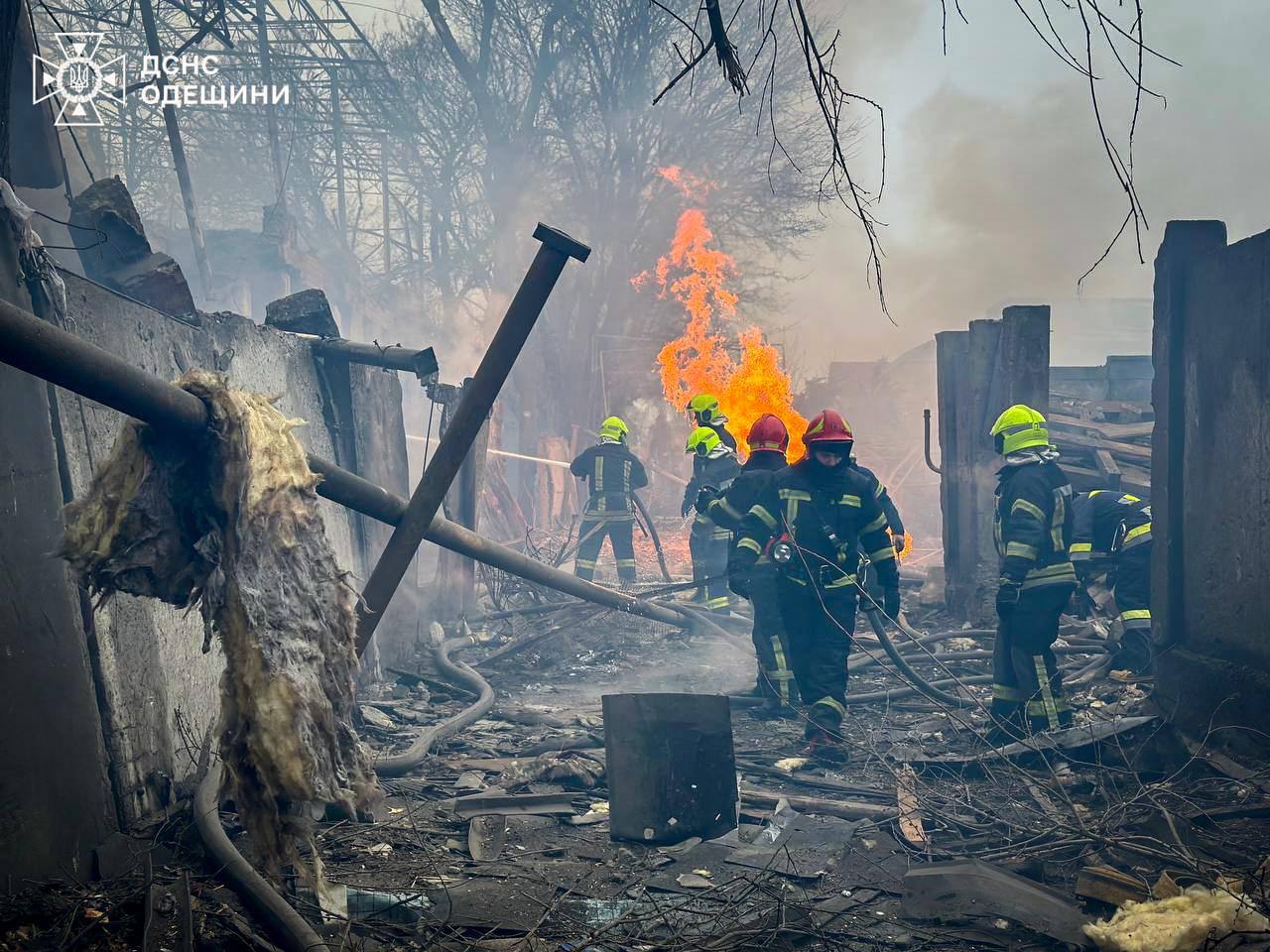Daily Flyer - March 16, 2024
A voice of Ukraine to the West

Russian missile strike on Odesa kills 21, injures 72 people

Russia launched two Iskander-M missiles against Odesa on March 15, resulting in the deaths of at least 20 people and injuring over 70 individuals as of 8 p.m. local time, according to officials. Among the casualties were first responders and police officers.
Russian forces utilized double-tap tactics, conducting a follow-up strike after the initial missile attack, which resulted in the deaths of a first responder and a paramedic who had arrived at the scene to assist the victims.
The Interior Ministry reported that at least 73 people sustained injuries of varying severity, including at least nine State Emergency Service employees.
Among those killed were Serhii Tetiukhin, Odesa's former deputy mayor, and Oleksandr Hostishchev, the commander of the police special forces unit Tsunami, as confirmed by local council member Andrii Vagapov.
The attack occurred between 11 a.m. and 11:20 a.m. local time, shortly after an air raid alert sounded in the region. The Southern Defense Forces reported that a three-story recreational building was destroyed by the strike.
In addition to causing casualties, the attack also inflicted damage on civilian infrastructure, including 10 houses and a gas pipeline, as reported by the emergency service.
Odesa Oblast Governor Oleh Kiper announced that there will be a day of mourning in the region on March 16 to honor the victims of the attack.
Government approves Ukrainian language development program until 2030
Ukraine's government has approved a comprehensive program aimed at strengthening the Ukrainian language's role as the state language in all aspects of public life until 2030.
Developed by the Ministry of Culture and Information Policy, the initiative seeks to counteract Russification efforts while promoting broader adoption and use of the Ukrainian language.
Acting Culture Minister Rostyslav Karandieiev highlighted the program's dual focus on domestic language promotion and international outreach, underscoring Ukraine's linguistic resilience.
By 2030, proficiency in the state language, following Ukrainian spelling and standards, will be mandatory for all civil servants. Ukrainian will be the primary language for communication, office tasks, and information retrieval, with measures planned to assist business employees in acquiring proficiency.
The ministry aims for Ukrainians to predominantly use Ukrainian in daily life, supported by access to high-quality cultural products and Ukrainian-language content. The program sets an ambitious target: by 2030, 80% of Ukrainians should speak Ukrainian at home, and the proportion of Ukrainian-language cultural products is expected to increase from 55% to 85%.
According to a poll by the Kyiv International Institute of Sociology (KIIS) released on March 12, Ukrainians widely oppose the use of the Russian language in official settings, with 81% against Russian being used as an official language in their region or as a state language.
Over 50 countries condemn Russia’s illegal election in occupied Ukrainian territories
Ukraine, along with 56 other countries and the European Union, has denounced the illegally organized voting in Russian-occupied territories of Ukraine as part of Russia's presidential election, announced Sergiy Kyslytsya, Ukraine's Permanent Representative to the United Nations, on March 15.
Russia commenced three days of voting on March 15 in what has been termed a pseudo-democratic presidential election, widely expected to grant Vladimir Putin, who has held power since 1999, another six years in office.
Moscow's organization of voting in occupied Crimea and parts of Ukraine's Donetsk, Luhansk, Kherson, and Zaporizhzhia oblasts violates international law.
Following a meeting of the U.N. Security Council regarding the illegal voting, Kyslytsya issued a joint statement on behalf of Ukraine and numerous other nations condemning Moscow's election campaign in the occupied territories.
The statement emphasized that holding elections in the territory of another U.N. member state without its consent constitutes a blatant disregard for the principles of sovereignty and territorial integrity. It asserted that such elections hold no validity under international law.
In addition to several European countries, the statement received support from the United States, Argentina, Australia, Canada, Chile, Costa Rica, Israel, Japan, Liberia, the Marshall Islands, New Zealand, Palau, Paraguay, South Korea, and Uruguay.
European, US officials condemn Russia's deadly attack on Odesa

European and U.S. officials have vehemently condemned Russia's missile attack on the Ukrainian city of Odesa on March 15, which resulted in the deaths of at least 20 people and left over 70 injured.
Russian forces launched two Iskander-M missiles against Odesa, causing extensive damage to homes and civilian infrastructure, as reported by Ukrainian authorities. Among the casualties were first responders and police officers.
The attack on Odesa is part of an escalation of missile and drone assaults by Russian troops on the southern city and its surrounding region, which is home to Ukraine's largest seaports.
Maia Sandu, the president of Moldova, which shares a border with Odesa Oblast, called for urgent assistance to Ukraine to defend itself and maintain peace in Europe. She expressed solidarity with Odesa and highlighted previous incidents of Russian drones and missiles violating Moldovan airspace.
Marija Buric, Secretary General of the Council of Europe, condemned the attack in the strongest terms, emphasizing the need to cease strikes on civilian infrastructure.
Peter Stano, the European Commission's lead spokesperson for foreign affairs and security policy, characterized the Odesa attack as another display of the barbaric nature of Russian aggression, asserting that those responsible would be held accountable.
Denise Brown, Head of the United Nations in Ukraine, expressed horror at the tragedy in Odesa and stressed the imperative to halt civilian casualties. She underscored the violation of international humanitarian law and the obligation to protect civilians.
U.S. Ambassador to Ukraine Bridget Brink condemned the attack as evidence of Russia's brazen aggression in Europe. She emphasized the urgency of assisting Ukraine in halting Russian aggression, emphasizing the need for immediate action as U.S. aid for Ukraine remains stalled in Congress.

